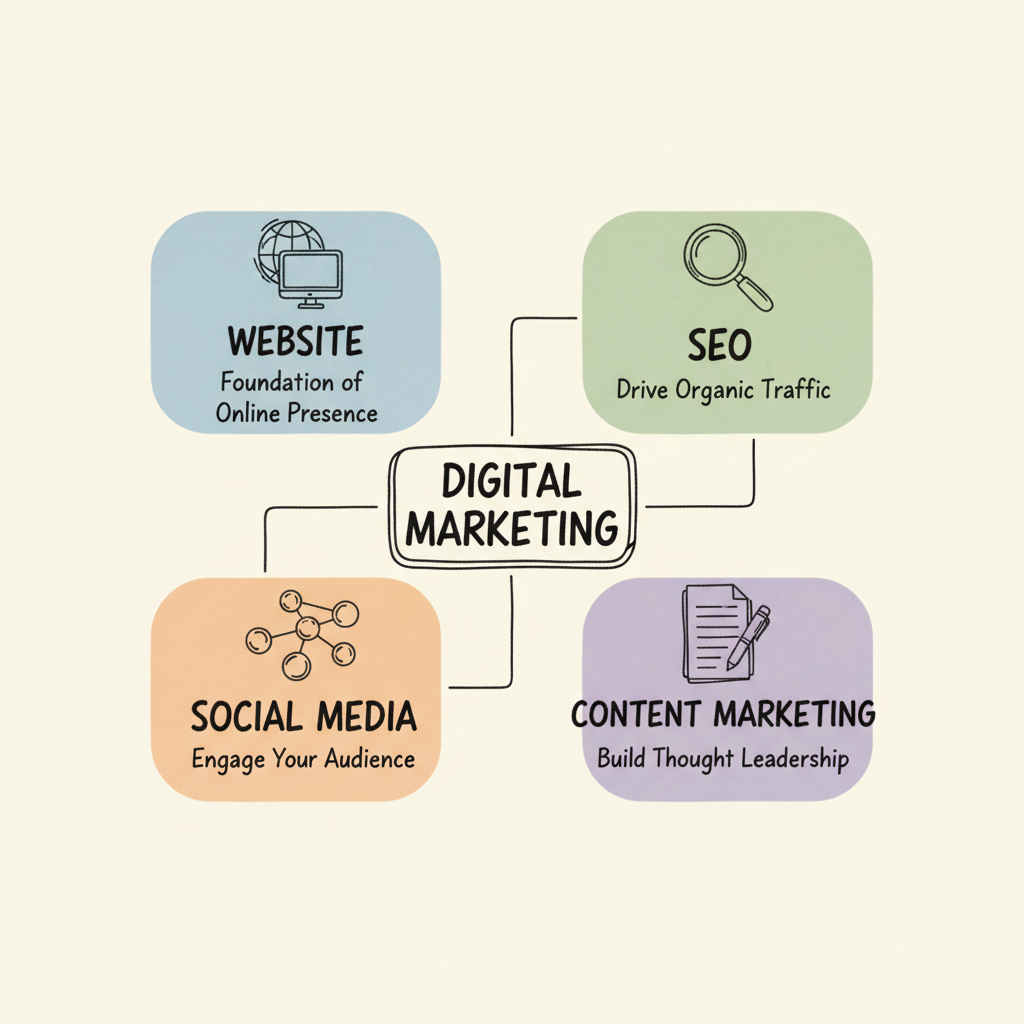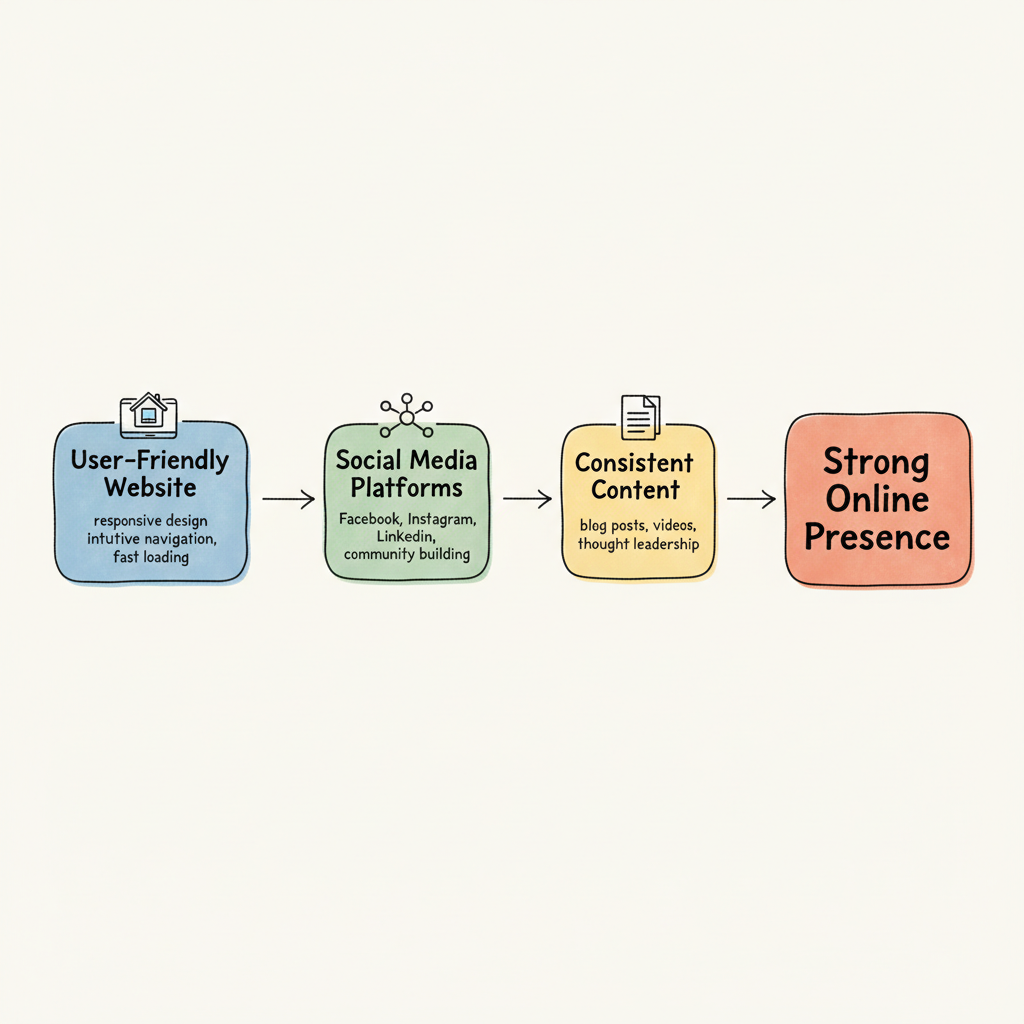In today's digital age, having a strong online presence is crucial for startups to thrive and compete in the market. Digital marketing plays a pivotal role in helping startups establish their brand, generate leads, and drive growth. Understanding the importance of digital marketing and leveraging its key elements can significantly impact a startup's success. This article will delve into the various aspects of digital marketing for startups and highlight the strategies necessary for building a robust online presence.
The Role of Digital Marketing in Business Growth:
Digital marketing serves as a catalyst for business growth by expanding the reach of startups, increasing brand awareness, and driving customer engagement. It enables startups to amplify their messaging and effectively target their desired audience, ultimately leading to increased conversions and revenue.
One of the key benefits of digital marketing for startups is its ability to level the playing field. In the past, startups often struggled to compete with industry giants due to limited resources and budget constraints. However, with the advent of digital marketing, startups now have the opportunity to showcase their products or services to a wider audience, regardless of their budget.
By leveraging digital channels such as social media, search engine optimization (SEO), and content marketing, startups can effectively reach their target audience and establish their brand in a competitive market. These digital marketing strategies allow startups to create a strong online presence, build credibility, and attract potential customers.
Why Startups Need to Prioritize Digital Marketing:
For startups, digital marketing offers a cost-effective way to establish their brand in a competitive market. By leveraging digital channels, startups can compete with industry giants and reach their target audience without breaking the bank. It provides startups with a level playing field, allowing them to showcase their products or services to a wider audience, regardless of their budget.
In addition to cost-effectiveness, digital marketing also provides startups with valuable insights and data. Through analytics tools and platforms, startups can track and measure the effectiveness of their marketing campaigns. This data-driven approach allows startups to make informed decisions, optimize their strategies, and allocate their resources more efficiently.
Furthermore, digital marketing enables startups to engage with their audience on a more personal level. Through social media platforms, startups can interact with their customers, address their concerns, and build meaningful relationships. This direct line of communication not only helps in building brand loyalty but also provides startups with valuable feedback and insights for continuous improvement.
Another advantage of digital marketing for startups is its ability to generate targeted leads and conversions. By implementing effective SEO strategies, startups can improve their website's visibility in search engine results, driving organic traffic and attracting potential customers who are actively searching for their products or services. Additionally, digital marketing allows startups to run targeted advertising campaigns, reaching specific demographics and increasing the chances of conversions.
In conclusion, digital marketing plays a crucial role in the success of startups. It offers a cost-effective way to establish a brand, reach a wider audience, and drive business growth. By leveraging digital channels and implementing effective strategies, startups can compete with industry giants, engage with their audience, and achieve their business goals.
Website Development and Design:
A well-designed and user-friendly website is the foundation of a startup's online presence. It serves as a virtual storefront, representing the brand to potential customers. By investing in professional website development and design, startups can create a positive first impression, establish credibility, and enhance the overall user experience.
When it comes to website development, startups need to consider various factors. They should focus on creating a responsive design that adapts to different screen sizes, ensuring that their website looks great on desktops, laptops, tablets, and smartphones. Additionally, startups should prioritize fast loading times to prevent users from getting frustrated and leaving the site.
Furthermore, startups should pay attention to the visual elements of their website. Using high-quality images, videos, and graphics can help capture users' attention and convey the brand's message effectively. Incorporating intuitive navigation and clear calls-to-action can also guide users through the website and encourage them to take desired actions, such as making a purchase or filling out a contact form.
Search Engine Optimization (SEO):
SEO is essential for startups to improve their website's visibility and rank higher on search engine results pages. By optimizing their website's content, structure, and technical aspects, startups can attract organic traffic and increase their chances of being discovered by potential customers.
When it comes to SEO, startups should focus on keyword research to identify the terms and phrases their target audience is using to search for products or services. By incorporating these keywords naturally into their website's content, startups can signal to search engines that their website is relevant to those search queries.
In addition to keyword optimization, startups should also pay attention to on-page SEO factors such as meta tags, headings, and URL structure. Optimizing these elements can help search engines understand the content of the website better and improve its chances of ranking higher in search results.
Off-page SEO is also crucial for startups. Building high-quality backlinks from reputable websites can signal to search engines that the startup's website is trustworthy and authoritative. This can result in higher rankings and increased organic traffic.
Social Media Marketing:
Social media platforms provide startups with a powerful tool to engage with their target audience, build brand loyalty, and drive website traffic. By creating compelling social media content, startups can leverage the viral nature of social platforms to expand their reach and generate leads.
When it comes to social media marketing, startups should first identify the platforms where their target audience is most active. This could be platforms like Facebook, Instagram, Twitter, LinkedIn, or even niche-specific platforms. By focusing their efforts on the right platforms, startups can maximize their impact and reach the right audience.
Startups should also consider creating a content calendar to plan and schedule their social media posts. This ensures a consistent presence on social media and allows startups to deliver a variety of content types, such as informative blog posts, engaging videos, eye-catching images, and interactive polls or quizzes.
Furthermore, startups should actively engage with their audience by responding to comments, messages, and mentions. This helps build a sense of community and fosters brand loyalty. By monitoring social media analytics, startups can also gain insights into their audience's preferences and adjust their social media strategy accordingly.
Content Marketing Strategy:
Developing and executing a well-defined content marketing strategy is crucial for startups to establish thought leadership, educate their audience, and nurture leads. By consistently creating and delivering valuable content, startups can position themselves as industry experts and build trust with their target audience.
When developing a content marketing strategy, startups should first identify their target audience's pain points, challenges, and interests. This allows them to create content that addresses these specific needs and provides value to their audience.
Startups can leverage various content formats, such as blog posts, e-books, whitepapers, infographics, podcasts, or videos, to deliver their message effectively. By diversifying their content, startups can cater to different learning preferences and engage with a wider audience.
It's also important for startups to promote their content through various channels, such as social media, email marketing, and partnerships with influencers or industry publications. By amplifying their content's reach, startups can attract more traffic to their website and generate leads.
Lastly, startups should measure the effectiveness of their content marketing efforts by tracking key metrics, such as website traffic, engagement rates, lead conversions, and customer retention. This data can provide valuable insights and help startups refine their content strategy for better results.

Building a strong online presence is crucial for startups to establish themselves in the digital landscape. In today's competitive market, having a user-friendly website, leveraging social media platforms, and consistently creating engaging content are key strategies that can help startups thrive.
Importance of a User-Friendly Website:
A user-friendly website is not just a luxury, but a necessity for startups. It is the first point of contact for potential customers and plays a crucial role in shaping their perception of the brand. By investing in responsive design, intuitive navigation, and fast-loading pages, startups can provide a seamless experience to their visitors. This, in turn, enhances user satisfaction, reduces bounce rates, and increases the chances of conversions. A well-designed website also instills trust and credibility in the minds of the audience, making them more likely to engage with the brand.
Leveraging Social Media Platforms:
Social media has revolutionized the way we communicate and interact with each other. For startups, it presents a vast opportunity to connect with their target audience on a personal level. By cultivating a strong presence on platforms such as Facebook, Instagram, Twitter, and LinkedIn, startups can tap into a large user base and reach potential customers from all corners of the world. Regularly engaging with their audience through compelling content, meaningful conversations, and interactive campaigns, startups can build brand awareness, foster relationships, and drive traffic to their website. Social media also provides valuable insights into consumer behavior and preferences, enabling startups to refine their marketing strategies and deliver more targeted campaigns.
Consistent and Engaging Content Creation:
Content is king, and startups need to create high-quality and relevant content to capture and retain the attention of their target audience. By consistently publishing blog posts, articles, videos, or podcasts, startups can position themselves as thought leaders in their industry. This not only helps in building credibility but also establishes trust and expertise in the minds of the audience. Engaging content that educates, entertains, or solves a problem can go a long way in keeping the audience hooked and coming back for more. Additionally, content creation is a great way to optimize a website for search engines, improving its visibility and driving organic traffic.
Building a strong online presence is an ongoing process that requires dedication, creativity, and adaptability. Startups that prioritize user experience, leverage social media platforms effectively, and consistently create engaging content are more likely to succeed in today's digital landscape. By investing time and resources in these strategies, startups can establish a solid foundation for growth and stand out from the competition.

Understanding Key Performance Indicators (KPIs):
Measuring the success of digital marketing efforts is crucial for startups to optimize their strategies and allocate resources effectively. By defining relevant key performance indicators (KPIs), startups can track the performance of their campaigns, identify areas for improvement, and make data-driven decisions.
Tools for Tracking Digital Marketing Success:
There are numerous tools available that can help startups monitor and analyze their digital marketing efforts. Tools like Google Analytics, SEMrush, and social media analytics platforms provide startups with valuable insights and data to evaluate the effectiveness of their campaigns, identify trends, and make informed decisions to improve their online presence.
Building a strong online presence is essential for startups to thrive in today's competitive market. Digital marketing offers startups the opportunity to establish their brand, reach their target audience, and drive growth. By understanding the importance of digital marketing, leveraging its key elements, and consistently measuring the success of their efforts, startups can position themselves for long-term success.
By submitting this form, you agree to our Privacy Policy and Terms & Conditions.